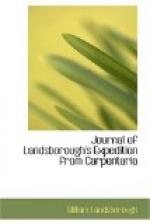On Tuesday morning (the 1st instant) at 8 o’clock we reached the mouth of the Albert River, on the sandy beach of Kangaroo Point.* There were about a dozen blacks, who appeared friendly and kept speaking to us as long as we were within hearing; but none in the barge (not even the native troopers) understood them. With the exception of Kangaroo Point, on the east bank, the river has an unbroken fringe of mangrove to a point two miles in a straight line from its mouth, and an unbroken fringe to a point three miles in a straight line from the mouth on the other side of the river. Above these points the lower part of the river has (where the edges have no mangrove) fine hard sandy sloping banks which are well adapted for landing horses or goods. A short time before we reached the point, above thirteen miles in a straight line from the mouth of the river where we anchored for the night, we saw about six blacks, who were very friendly and followed us for some time. We found that the water was fresh when we reached Alligator Point, about twenty miles in a straight line from the mouth of the river; above this point the fringes of mangrove are scarce on the edges of the river, and back from the river there is rising ground, consisting of fine, well-grassed, and slightly timbered downs. On passing up the river, on the left bank, we observed a blackfellow asleep. At sunset we anchored at a point about twenty-six miles in a straight line from the mouth of the river, where a river from the southward, which Mr. Woods called the Barkly, joins the Albert River.
(Footnote. Kangaroo Point would in my opinion be a healthy site for a township. The ground is sufficiently high along the shore at that place, and without mangroves. We did not find water there, but, as there were a few blacks almost always in that neighbourhood, I have no doubt that there is some surface water, or that it is easily procured by digging.)
On going on shore on the western bank of the Albert River I found within a hundred yards of it a waterhole at which it would be more convenient to water stock than the river, as the banks of it are at this place too steep. Above the junction of the Barkly the Albert River is not navigable for even boats, from its being too full of snags. On the following morning we went up the Barkly on the barge for about two miles, to where it was too full of snags to proceed further up the river by water. We then took a walk over the Plains of Promise and crossed at a point about three miles from where we had left the barge. In doing so we started a black man and woman; they were both old and naked; the former went out of sight by running down the bank and plunging into the river, and the latter climbed up a tree, where, while we remained, she continued speechless. Where we crossed the Barkly it had a narrow muddy bed, the water in which was cool from its being shaded with pandanus, palms, and Leichhardt-trees. A short distance lower we recrossed by a tree which the carpenter




